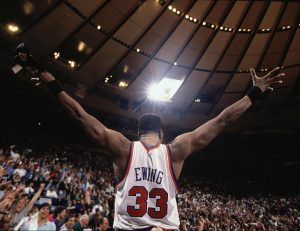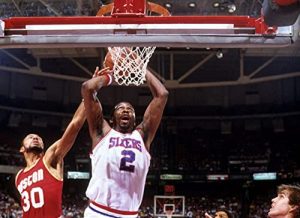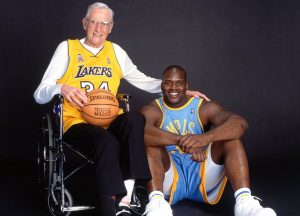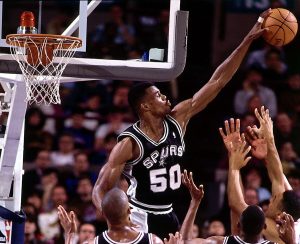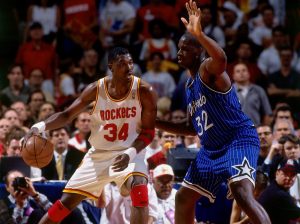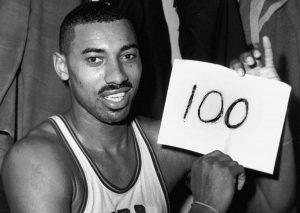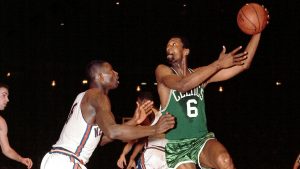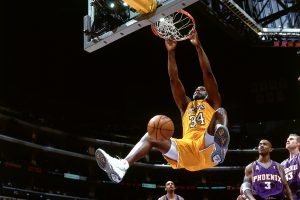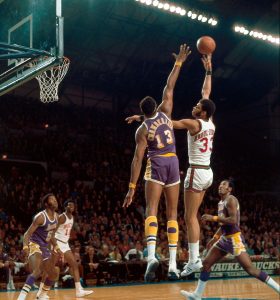By far the most competitive position in NBA History, Centers has dominated the sport in nearly every decade. In every decade since the leagues existence, the best big man of the era won a championship. The 60’s seen Bill Russell and Wilt Chamberlin dominate. Kareem took over the 70’s and 80’s. Hakeem Olajuwon and Robinson snagged a few titles in the 90’s. The early 2000’s were dominated by Shaq.
What makes this debate of best center of all time so difficult is that stats and championships are not nearly enough to distinguish the elite of elites. It is the only position where there is no definitive answer for the top spot. You could go with Russell and his 11 championships, or you could lean towards Wilt’s singular dominance. How about Kareem with his 6 MVP’s and 6 titles? Oh and what about the most dominant force of modern basketball, Shaq? Each of these guys have a solid claim.
10: Dwight Howard
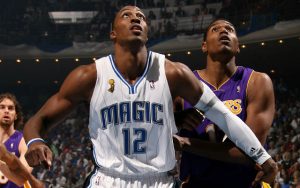
If you started watching the NBA when Dwight Howard was a Laker, or Rocket, you are definitely confused as to why he cracked the top 10 at the toughest position. But prime Howard in Orlando is more than enough for him to sneak in the back end of the list.
In his tenure with the Orlando Magic (2004-05 to 2011-12) Howard was the best center in the league. He averaged 18.4 points, 13.0 rebounds, 1.5 assists, 1.0 steals, 2.2 blocks. He compiled 6 all star selections, and 3 defensive player of the year awards. Howard was also the lone force that carried the 2009 Magic to the NBA Finals in the eventual loss to the Los Angeles Lakers. The run doesn’t get enough attention as it should considering it was during the Big 3 Celtics era, and peak athletic Lebron James.
While his first tenure in Los Angeles was underwhelming, Howard was still productive statistically. He averaged 17.1 points, 12.4 rebounds, and 2.4 blocks as a Laker. It won’t be remembered fondly but it happened.
When you add in his years with Houston and the two forgetful seasons with Atlanta and Charlotte, Howard averaged a double double for the first 14 seasons of his career. Sure his dominance diminished as he aged, but the production was always there.
The biggest knock on Howard was his inability to accept a lesser role for the better of the team. We seen it come up in both Los Angeles and Houston where he publicly voiced his displeasure for lack of touches in the post. But the narrative has began to change with his latest run with the Lakers, as he has thrived in a defensive and rebounding role off the bench.
Career Averages: 16.8 points, 12.3 rebounds, 1.9 blocks
Best Season: 22.9 points, 14.1 rebounds, 2.4 blocks
Accolades:
MVP: 0
Championships: 0
All-Star Selections: 8x
All NBA Teams: 14x
Defensive Player of the Year: 3x
9: Patrick Ewing
From the time Ewing stepped into the league, he was elite but never the best at the position. He entered the league with Kareem Abdul-Jabbar was still wining titles. Hakeem Olajuwon was more skilled, and Moses Malone was dominating the boards. But that doesn’t mean Ewing didn’t leave his mark on the league.
From his rookie year on, Ewing proved he would be a dominant offensive threat. He averaged at least 20 points in each of his first 13 seasons. From 1989-1998, Ewing averaged at least 20 points and 10 rebounds. More importantly, Ewing provided stability and consistent winning for the Knicks thought his career.
Like most of the great players in the 90’s, Ewing and the great Knicks teams of the 90’s reached their peak in the same window of the Jordan Bulls. The Knicks battled the Bulls like no other, but never got over the hump.
Ewing had a one year window to break through when Jordan decided to retire for baseball, but the Knicks fell just short of delivering a championship. The Knicks made it all the way to Game 7 of the NBA Finals, but lost to Olajuwon’s Houston Rockets.
Career Averages: 21.0 points, 9.8 rebounds, 2.4 blocks, 1.9 assists, 1.0 steals
Best Season: 28.6 points, 10.9 rebounds, 4.0 blocks, 2.2 assists, 1.0 assists
Accolades:
MVP: 0
Championships: 0
All Star Selections: 11x
All NBA Teams: 11x
Rookie of the Year
8: Moses Malone
Moses Malone is far and away the best offensive rebounder the league has ever seen. His 6,731 offensive rebounds is the most all-time by a large margin. Second place is Robert Parish with 4,598. He will likely never lose that record.
His rebounding prowess earned him the name “Chairman of the Boards,” but Malone was more than just a rebounder. In his best scoring season, Malone scored 31.1 points per game, and was at 20 points per game for his 20 year career. And on the defensive side of the court, Malone could hold his own making two all defensive teams.
Career Averages: 20.6 points, 12.2 rebounds, 1.4 assists, 1.3 blocks, 0.8 steals
Best Season: 24.8 points, 17.6 rebounds, 1.5 blocks
Accolades:
MVP: 3x
Championships: 1x
All Star Selections: 13x
All NBA Teams: 8x
Rebounding titles: 6x
7: George Mikan
It is hard to fathom a time before Bill Russell and Wilt Chamberlin were dominating the sport. But there was and he was quite the dominant big man himself.
George Mikan, “Mr. Basketball”, was professional basketball’s first true star and its first great big man. Mikan was named by the Associated Press as the greatest basketball player of the first half of the 20th century. His Lakers teams won four NBA titles.
His career is extremely short in comparison to the legends on this list, and the league was still in its start up years. But Mikan was dominant and impacted NBA rules and regulations.
It’s because of Mikan that goaltending is illegal and the lane is as wide as it is. The NBA had to come up with a way to mitigate the impact Mikan. He would block shots away at the rim and was unguardable down low under the rim.
We have no clue how Mikan would perform against Bill Russell and Wilt Chamberlin, let alone in the modern NBA, but we have to recognize his imprint on the early stages of the sport and culture.
Career Averages: 23.1 points, 13.4 rebounds, 2.8 assists
Best Season: 28.4 points, 14.1 rebounds, 3.1 assists
Accolades:
MVP: 0
Championships: 4x
All-Star Selections: 4x
All NBA Teams: 6x
6: David Robinson
Despite being the number one overall pick in the 1987 draft, David Robinson didn’t make his debut until 1989 due to his service commitment to the Navy. Regardless of his late start, Robinson carved out one hell of a career.
When you base it off advanced stats, Robinson is one of the best players to ever play the game. His advanced stats put him rarified air with the likes of Michael Jordan. Jordan is the lone player ahead of “The Admiral” in career win shares per 48 minutes. The difference between the two legends is minuscule: .2505 to .2502. But even his basic stats are extremely impressive.
During his first seven years in the league, Robinson averaged 25.6 points, 11.8 rebounds, 3.6 blocks, 3.1 assists and 1.7 steals with a 59.2 true shooting percentage. But his dominance continued well past 7 years.
At the tail end of his career, Robinson won his only two NBA titles playing alongside Tim Duncan.
Career Averages: 21.1 points, 10.6 rebounds, 3.0 blocks, 2.5 assists, 1.4 steals
Best Season: 29.8 points, 10.7 rebounds, 4.8 assists, 3.3 blocks, 1.7 steals
Accolades:
MVP: 1x
Championships: 2x
All-Star Selections: 10x
All NBA Teams: 19x (includes defensive teams)
Rookie of the Year
Scoring Champion: 1x
5: Hakeem Olajuwon
When we talk about a complete center, Hakeem Olajuwon is the prototype. Olajuwon dominated on the block with his “Dream Shake,” and rebounded with the best of them. But the thing that set him apart from the most was his defense.
Olajuwon is the NBA’s all-time leader in blocked shots, with 3,830 rejections. That is 541 more blocks than the second place Dikembe Mutombo. He also recorded 10 blocks in a game 11x, and has 10 triple doubles that includes 10+ blocks.
On March 29, 1990, Olajuwon posted a quadruple double with 18 points, 16 rebounds, 11 blocks and 10 assists.
While being the all-time leader in blocks, Olajuwon will forever be remembered for his dream shake and post footwork. Shaquille O’Neal is on record saying Olajuwon is the only center he could not figure out. If you need evidence of this, look at their Finals matchup in 1995.
Despite retiring in 2002, Olajuwon continued to stay around the game. In the offseason he would hold workouts with some of the leagues best talents to better their foot work and post moves. Hakeem said his greatest successor and student was Kobe Bryant.
Career Averages: 22.7 points, 11.6 rebounds, 3.2 blocks, 2.6 assists, 1.8 steals
Best Season: 24.3 points, 14.0 rebounds, 4.6 blocks, 2.9 assists, 2.1 steals
Accolades:
MVP: 2x
Championships: 2x
DPOY: 2x
All-Star Selections: 12x
All NBA Teams: 22x (9 All defensive teams)
4: Wilt Chamberlin
Anytime a graphic comes across the screen during an NBA game, expect to see Wilt Chamberlin’s name at the top of the list. Statistically there is not a single player in his stratosphere. His famed accomplishments include 100 points in a game, averaging 50.4 points and 25.7 rebounds for a season, and his 515 consecutive games of scoring 40 or more points. In a six year stretch from 1959-1965, Wilt averaged 40.6 points, 24.9 rebounds and 3.1 assists.
The man was mythical. The two things preventing Chamberlin from not only being the best center, but the best to ever play the sport is championships and era he played in.
The age old conversation is what would Wilt do in modern basketball, and what would Shaq do in the 60’s? We can’t even begin to understand nor translate the talents across eras. But what we do know is Wilt was an all world athlete.
Here is an excerpt from a piece Gary M. Pomerantz wrote for The Post Game.
“If you define athleticism as a combination of size, speed, strength and agility, the young Dipper, a decathlete and basketball star who at full speed covered nearly eight feet of hardwood with each elongated stride, might have been the greatest pure athlete of the 20th century.”
Career Averages: 30.1 points, 22.9 rebounds, 4.4 assists
Best Season: 50.4 points, 25.7 rebounds, 2.4 assists
Accolades:
MVP: 4x
Championships: 2x
All-Star Selections: 13x
All NBA Teams: 12x
Rookie of the Year
Single Game scoring record
All Time Leader in Rebounds per game, and total rebounds
3: Bill Russell
While Bill Russell doesn’t have the glamorous stats Wilt Chamberlin does, he has something more prestigious, 11 rings. You can throw every excuse in the book my way about the competition being weak, only a few teams in the league, etc. I’ll respond with Russell won 9 of his 11 rings during Wilt’s career, so there was definitely head to head comp for Russell.
The era debate is once again in question for Russell as it was for Wilt, but he dominated his era. Would he have 11 rings in the current day system, not a chance. But we can’t play the what if game when ranking players careers. Russell did however give his take on how he would fare with the best to ever do it.
When he received a Lifetime Achievement Award in 2017, Russell pointed at Shaquille O’Neal, David Robinson, Kareem Abdul-Jabbar, Alonzo Mourning and Dikembe Mutombo, and said, “I would kick your ass.”
Career Averages: 15.1 points, 22.5 rebounds, 4.3 assists
Best Season: 18.9 points, 23.6 rebounds, 4.5 assists
Accolades:
MVP: 5x
Championships: 11x
All-Star Selections: 12x
All NBA Teams: 12x
2: Shaquille O’Neal
Shaq’s combination of size, strength, skill, and power may never be duplicated. Unlike Wilt, Shaq was dominating premier athletes and throwing the less elite around like rag dolls.
One of the all time best defensive centers Hakeem Olajuwon discussed Shaq’s dominance in The Players Tribune.
“Shaq was a beast. If you let him get position, it was over. … There won’t ever be someone with Shaq’s combination of size and skill.”- Hakeem on Shaq.
Throughout the late 90’s and most of the 2000’s, Shaq dominated the league. When you look at his 10 year peak from 1993-94 to 2002-03, Shaq averaged 28.1 points, 11.9 rebounds, 3.0 assists and 2.5 blocks. During that peak, Shaq would make 4 NBA Finals, one with Orlando, and a three-peat in Los Angeles.
What raises Shaq’s resume even more is his elevated play when it mattered most. During the Lakers 3-peat, Shaq averaged 35.9 points, 15.2 rebounds, 3.5 assists and 2.9 blocks in 15 Finals games. If that isn’t impressive enough for you, in the 2000 NBA Finals, he averaged 38.0 points, 16.7 rebounds, 2.7 blocks and 2.3 assists.
Shaq’s career averages are lower than expected, but that can be attributed to him sticking around a few years too long, and the injuries that complied as he aged. But still his career numbers are quite impressive.
Career Averages: 23.7 points, 10.9 rebounds, 2.5 assists, 2.3 blocks, 0.6 steals
Best Season: 29.7 points, 13.6 rebounds, 3.8 assists, 3.0 blocks, 0.5 steals
Accolades:
MVP: 1x, 3x Finals MVP, 3x All-Star Game MVP
Championships: 4x
All-Star Selections: 15x
All NBA Teams: 18x
Rookie of the Year
1: Kareem Abdul-Jabbar
Kareem Abdul Jabbar is the only player on this list that has a legit claim as the G.O.A.T No offense to the rest of the guys on the list, but Kareem has the full package. The individual statistics, team success, MVP’s. Whatever the rubric for grading a player, Kareem checks the box.
Want the individual records? Kareem is the all time NBA scoring leader with 38,387 points.
He got the signature move covered too with his Sky Hook, the single most unstoppable move in league history.
In 20 NBA seasons, Kareem Abdul-Jabbar made 19 All-Star teams (first all-time), 15 All-NBA selections (tied for first all-time), 11 All-Defensive selections (fourth all-time), six NBA titles, six MVPs (first all-time), four blocks titles, two scoring titles, two Finals MVPs and one rebounding title.
Kareem’s longevity and sustained dominance may be unmatched. From 1969-1986, he averaged 26.4 points, 12.1 rebounds, 4.0 assists, 2.9 blocks, 1.0 steals. That is 17 consecutive seasons of 20+ points per game averages.
When you look at his 10 year peak, Kareem averaged 28.6 points, 14.8 rebounds, 4.5 assists and 3.5 blocks.
His MVP awards were spread from 1971 to 1980. His first and last Finals MVPs came in 1971 and 1985, well over a decade apart.
Career Averages: 24.6 points, 11.2 rebounds, 3.6 assists, 2.6 blocks, 0.9 steals
Best Season: 34.8 points, 16.6 rebounds, 4.6 assists
Accolades:
MVP: 6x league, 2x Finals MVP
Championships: 6x
All Star Selections: 19 x
All NBA Teams: 15x
All Defensive Teams: 11x
4x Block Champion
2x Scoring Champion
1x Rebounding Champion
